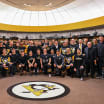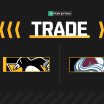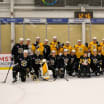On Tuesday, the Penguins boarded the team plane for the first time in months and flew to Philadelphia, where they will open the 2020-21 campaign by playing the Flyers at Wells Fargo Center on Wednesday and again on Friday.
In the words of Brandon Tanev, the Penguins are "chomping at the bit" to get the shortened season started with a series against their biggest rival.
"Everyone's excited," Tanev said. "Obviously, we've had a lot of time off. Training camp's been fun with a new group of guys, and now we're really excited to get the season going in Philly."
Off to Philly
The Pens are "chomping at the bit" to get the 2020-21 season started against the Flyers

By
Michelle Crechiolo
Penguins Team Reporter
The games against the Flyers will kick off a schedule that has a much different look and feel compared to the traditional 82-game campaign.
The NHL's temporary realignment means that the Penguins will play all 56 of their games against the other members of the East Division, facing off against the Flyers, Boston Bruins, Buffalo Sabres, New York Islanders, New York Rangers and Washington Capitals eight times each (four home, four away).
"It's going to be a lot of rivalry games and a lot of hostility," Jake Guentzel said. "It's going to be fun to play in as a player."
Every matchup was already going to have a playoff feel, as less games means less margin for error. But that intensity will be taken to another level as teams battle to gain ground in the standings with the division, with each matchup being a four-point game.
"You'll see the rivalries grow this year and you're going to see the games be that much tighter just because everyone's fighting for position," Tristan Jarry said. "I think games will be a lot faster and they'll be a lot more intense. A big thing will be trying to get on a run as much as you can. Try and keep it rolling and trying to keep the lows to a minimum."
And the majority of those games will be played in series like this one in an effort to minimize travel as much as possible in the midst of the COVID-19 pandemic. The Penguins have 26 sets of games where they play the same opponent in two consecutive games, which will rachet up the rivalry aspect.
"Obviously they're going to be intense games, especially when you know that you're going to be playing them two or three times and then in this whole season eight times," Brian Dumoulin said. "It's going to create a lot of rivalries. And a lot of the teams in our division already know each other really, really well. So it's going to be a lot of fun. Those are the games that you get up for."
Dumoulin said that he's excited about the composition of the schedule because it allows him to get much more familiarized with opposing players.
"I like to get to know players' tendencies and what they're going to do," Dumoulin said. "If they finish me on a hit, if they peel off, all that information kind of helps me as a player. So I enjoy these the two-game series."
But on the flip side of that, Jason Zucker said they will have to find ways to be less predictable as a team while still remaining true to their identity as the season wears on.
"Whether that's breakouts, power plays, penalty kills, neutral zone transitions, O-zone play - pretty much every facet of the game you're going to have to try to mix up in some way playing a team eight times," Zucker said.
But at least at the beginning, a focus for the Penguins is just to hit the ground (or ice) running.
"I think especially when you play eight games against every team, it's going to be important to get off to a good start and get on the right side of things when you play them two games in a row every time," Marcus Pettersson said. "I think it's going to be huge to get off to a good start here and create our own energy."
The East is going to be a very strong, very competitive division. Four of the teams - Pittsburgh, Philadelphia, Washington and Boston - all finished in the NHL's top seven last season, while the Islanders and Rangers both made the playoffs and the Devils and Sabres took strides in the offseason to get better. It will be an absolute battle for the four playoff spots, but it's one the Penguins are looking forward to.
"There's a lot of really good teams with great players, and so what better way to find out where you stack up as a team than playing those teams the whole year and getting your team game to the right level once playoffs come around," Mike Matheson said. "You don't want to walk through the season thinking you're better than you are. So I think this setup gives us the ability to really start strong and play great teams."


















































